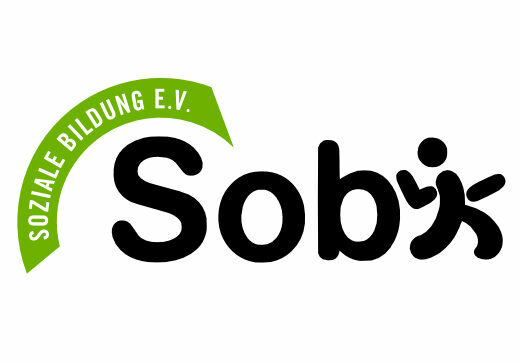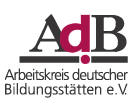Since 2016 we have been a member of the “Arbeitskreis deutscher Bildungsstätten“ (AdB), in English, “The Working group of German Educational Institutions“.
We are located in the AdB with our project:
Historical-political education in the context of the Pogroms in Rostock-Lichtenhagen 1992
1. Socio-political context of the project
The pogrom in Lichtenhagen in August 1992, accompanied by a perceived failure of state and civil society structures, more than 25 years later is still considered a cipher for
- the populist and instrumentalizable formation of a population mass in the context of social transformation processes against a minority;
- developments of right-wing extremism and populism;
- descriptions of and positions vis-à-vis developments in discourses on migration policy, especially asylum policy;
- reflections on the demands and challenges of integration and participation of people with and without a migration background living in the FRG for state and civil society structures.
The current references to the events in Lichtenhagen 1992 in connection with questions of the appropriateness of state action towards refugees, especially from Syria, Iraq and Afghanistan, and the sharp increase in attacks on refugees and refugee accommodation also testify to the continuing relevance of the cipher within collective narratives in the Berlin Republic. In the core area of the various references, the cipher refers to the connection between resentments and structural exclusions contained in collective narratives and their significance for collective dynamics of action towards refugees and other minorities. In this respect, the preoccupation with the context of the events in Lichtenhagen 1992 and their consequences always raises the question of the current handling of forms of discrimination.
In addition to the meaning of the cipher on the symbolic level of collective narratives, the events in Lichtenhagen 1992 are localized and have a strong impact on the local and regional context. specific weight in the national culture of memory. Forms of coming to terms with and referring to the events by local actors are more clearly based on their references to the events in their everyday lives. The ongoing regional reappraisal is characterized by the tension between the various narratives on the events, their effects and evaluations.
2. Basic understanding of the educational project
Formats of historical political education can take up the cipher in several ways and make it accessible to emancipatory learning processes.
The basic understanding of the project is that historical-political education should not be reduced to a standpoint to be conveyed in relation to historical events, which is to be reduced to a canon of representable facts and their fixed evaluation, but should be actively shaped by actors in their memories and narratives. Benjamin’s reflection that ‘to articulate the past historically does not mean to recognize it as it actually was. It means taking possession of a memory as it ‘flashes up at the moment of danger’ can provide programmatic guidance for this. It is not a matter of understanding the memory of the events of a constructivist uncertainty, but rather of understanding them as (civilisation) ruptures in the collective-identitary self-conception that have an after-effect and, in contrast, of becoming capable of reflection and action.
Walter Benjamin, “On the Concept of History”, in: Collected Writings, Vol. 1-2, Frankfurt/M. 1991, 702f
The concept of a breach of civilization is characterized by the contexts of Auschwitz and genocides, but is also used here to mark incisive events that call into question the democratic self-understanding of the community and, in their normative effect, call for legitimization and reflection on the basis and sources of hitherto self-evident orientation for living together in the community.
3. Methodological and didactic orientations of the project
Within the framework of the project, formats will be developed that enable interest- and address-oriented learning processes. The documentary basis for this is the Lichtenhagen Archive, which has been under construction since 2015. The work and opening of the archive will be accompanied by educational offers and is primarily aimed at young people who have so far had too few opportunities to deal with the events of the pogrom, its socio-political context and consequences in an interest- and life-oriented way. Therefore new ways of participation-oriented and digital education are to be realized. Furthermore, the project will offer formats that enable actors to further educate themselves for their vocational-pedagogical work or their civil society commitment for and with young people in the field of remembrance culture(s).
Within the framework of the project, memory is understood as a field of learning and participation in the:
- enabling an examination of social conditions and developments as a context for memory issues;
- making a contribution to lively and inclusive cultures of remembrance anchored in civil society as a condition for the constitution and development of collective memories and their corrective and orientation function with regard to present and future challenges.
Through the educational formats to be developed step by step, 3 educational programme strands are to be established:
1. educational programmes based on the theme of remembrance ‘Pogrom in Rostock-Lichtenhagen 1992’ (including the event itself, GDR transformation, asylum policy of the FRG, racism, right-wing extremism and populism)
2. generalizable or continuing discourse beyond the concrete examination of the topic ‘Pogrom in Rostock-Lichtenhagen 1992’ (among others human rights, post-colonial discourse, post-migration)
3. formats for conveying competence (e.g. methodology/didactics of historical political education, cultural education, process facilitation, participation procedures, dialogue-oriented work with and between groups).

